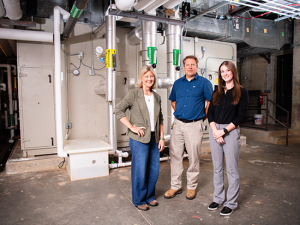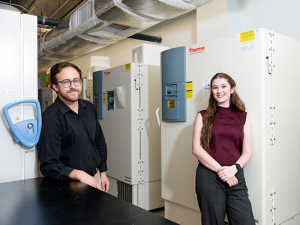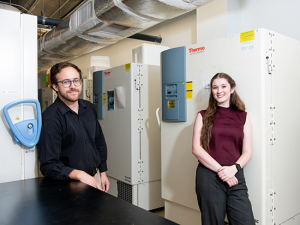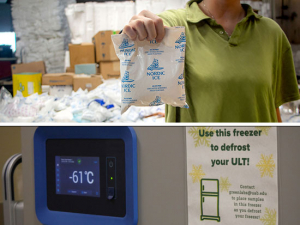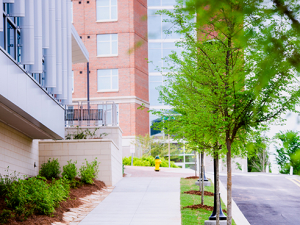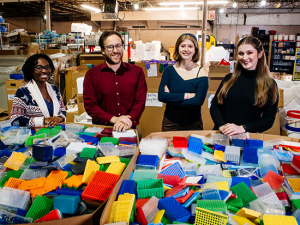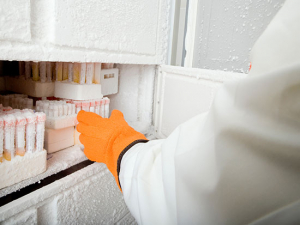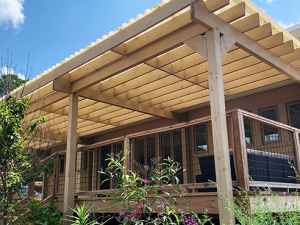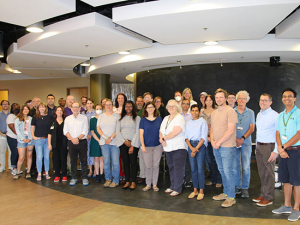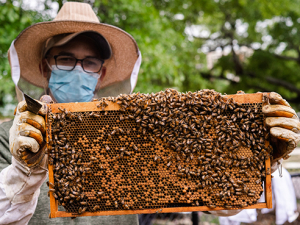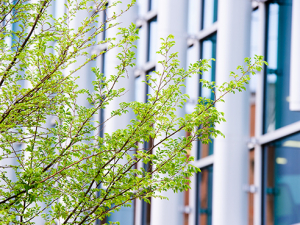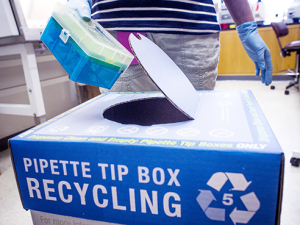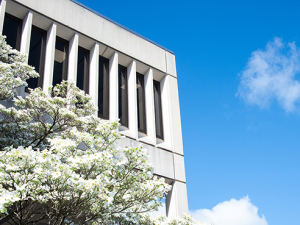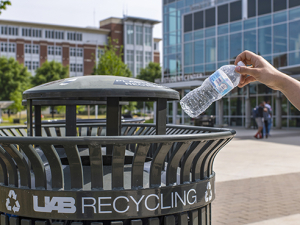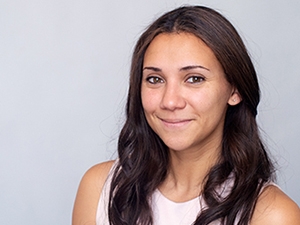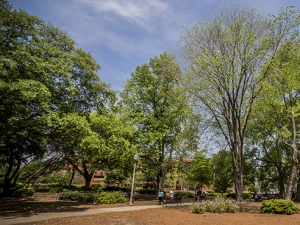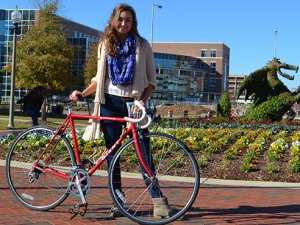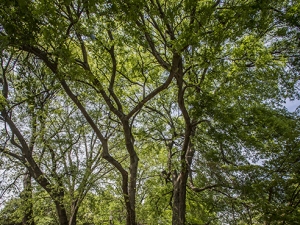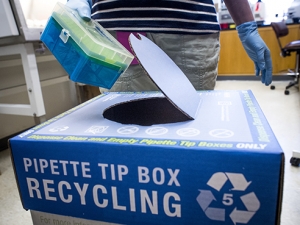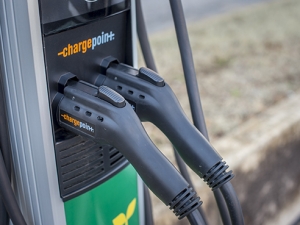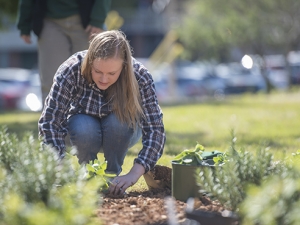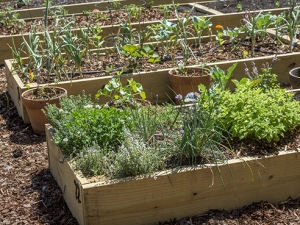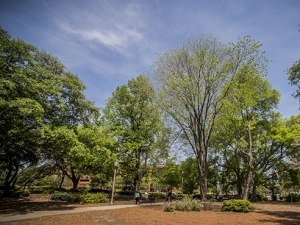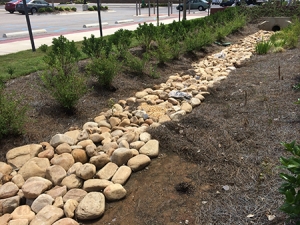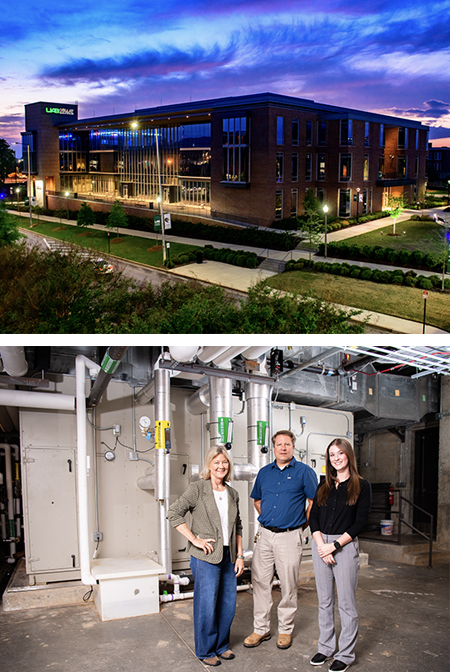 Cool collaboration: Collat School of Business faculty member Sarah Culver, Ph.D., Energy Management engineering manager Brad Gwin and UAB Sustainability's Emily Colpack, coordinator of the Green Labs program, with one of three air handling units in the Collat building (shown at top from University Boulevard). Top photo: Steve Wood; bottom photo: Ian Logue | UAB Marketing and CommunicationsAt the Collat School of Business building on University Boulevard, annual utility costs (excluding water and sewer) are approximately $600,000 per year. But the school recently saw a significant saving on its monthly utility bills — some 40 percent during a pilot month in July 2024 — thanks to a partnership with UAB Energy Management and UAB Sustainability, both part of UAB Facilities.
Cool collaboration: Collat School of Business faculty member Sarah Culver, Ph.D., Energy Management engineering manager Brad Gwin and UAB Sustainability's Emily Colpack, coordinator of the Green Labs program, with one of three air handling units in the Collat building (shown at top from University Boulevard). Top photo: Steve Wood; bottom photo: Ian Logue | UAB Marketing and CommunicationsAt the Collat School of Business building on University Boulevard, annual utility costs (excluding water and sewer) are approximately $600,000 per year. But the school recently saw a significant saving on its monthly utility bills — some 40 percent during a pilot month in July 2024 — thanks to a partnership with UAB Energy Management and UAB Sustainability, both part of UAB Facilities.
The building’s three massive air-handling units, each “half as big as your house,” are major energy consumers, said Brad Gwin, engineering manager for Energy Management. The air handlers exchange up to 30,000 cubic feet of air per minute, keeping the building at a comfortable temperature even in the midst of a sweltering Alabama summer. The amount of energy and power required is a function of how many people are in the building, of course. But even at night and on weekends, temperature-sensitive audiovisual equipment required the use of the air handlers.
Collaboration enables “unoccupied mode”
That is, until Gwin and his team studied the building’s schematics and noticed that adding some ductwork, fans and monitoring equipment could allow chilled air from the standalone cooling systems in the building’s communications rooms to be used to cool the audiovisual rooms as well. “That load is minimal compared with what we used to cool the entire building,” Gwin said. Since the alterations were completed, “we have been able to set the building to ‘unoccupied’ mode at night and on weekends and holidays,” Gwin added.
The connection between Collat and Energy Management came through Associate Professor Sarah Culver, Ph.D., and UAB Sustainability Manager Bambi Ingram. Culver is no stranger to energy projects. “Sustainability has always been a value of mine,” she said. Starting in 2019, she began to take students on annual study abroad trips to Copenhagen, Denmark, which has an ambitious plan to be the first carbon-neutral world capital by 2025. “I wanted UAB students to experience a vibrant city that regularly ranks among the top 10 most liveable cities in the world,” Culver said. In addition to visits to sustainability projects in Copenhagen, Culver also takes students to Malmo, Sweden, only a short train ride away, which is a carbon-neutral city. (Culver talks about her 2024 trip in this video on Instagram.)
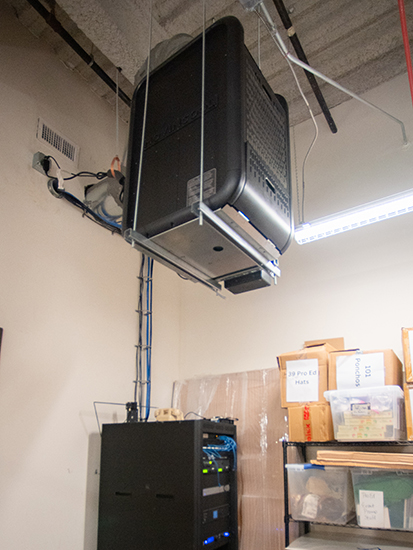 A small cooling unit, suspended from the ceiling in a room holding the audiovisual technologies for Collat's ground floor lecture halls, along with ductwork changes to reroute chilled air to other audiovisual rooms, enabled major savings by reducing air handler usage across the building on nights and weekends. Photo by Ian LogueOn one such trip, in 2022, Culver’s group included Ingram. After UAB introduced its Forging Ahead strategic plan update in 2023, Collat School of Business Dean Christopher Shook, Ph.D., began revising his school’s plan to align with the university’s new goals, including an increased focus on sustainability. Shook tapped Culver to be part of a work group focused on sustainability at Collat, and she contacted Ingram’s team at UAB Sustainability to brainstorm ideas. Culver found out that the Hill Center would be undergoing an energy audit over spring break. So she and her fellow economist Joshua Robinson, Ph.D., interim chair of the Department of Marketing, Industrial Distribution and Economics, pitched Dean Shook on the possibility of Collat’s undergoing its own audit, which could also allow the school to explore the sustainability implications of hybrid work.
A small cooling unit, suspended from the ceiling in a room holding the audiovisual technologies for Collat's ground floor lecture halls, along with ductwork changes to reroute chilled air to other audiovisual rooms, enabled major savings by reducing air handler usage across the building on nights and weekends. Photo by Ian LogueOn one such trip, in 2022, Culver’s group included Ingram. After UAB introduced its Forging Ahead strategic plan update in 2023, Collat School of Business Dean Christopher Shook, Ph.D., began revising his school’s plan to align with the university’s new goals, including an increased focus on sustainability. Shook tapped Culver to be part of a work group focused on sustainability at Collat, and she contacted Ingram’s team at UAB Sustainability to brainstorm ideas. Culver found out that the Hill Center would be undergoing an energy audit over spring break. So she and her fellow economist Joshua Robinson, Ph.D., interim chair of the Department of Marketing, Industrial Distribution and Economics, pitched Dean Shook on the possibility of Collat’s undergoing its own audit, which could also allow the school to explore the sustainability implications of hybrid work.
“Sarah gets the big picture,” Ingram said. “She and the dean’s office are very interested in how they can be more energy efficient, and we collaborated with Energy Management to see what we could do. We have been talking to various building managers about doing something like this; the team at Collat was eager to explore the benefits.”
Magnitude of savings “will appeal to many units on campus”
In addition to the ductwork changes to reduce the usage of the building’s air handlers, Shook agreed to set up a pilot for the week of July 4, 2024, when UAB would be closed on the Thursday and many employees would be taking vacations before and after. Collat employees were strongly encouraged to work remotely during the week. Meanwhile, working with Ingram and Emily Colpack, head of UAB’s Green Labs program, the Collat team encouraged employees to close their blinds (nearly all offices in the building have windows), turn off fans, unplug mini fridges with nothing inside, power down computer monitors and put their computers into sleep mode. (These are exactly the kinds of changes that Colpack works with individual UAB principal investigators to implement when they join the voluntary Green Labs program.)
By comparing energy usage in July 2024 with the same period the previous year, the changes are estimated to have saved just under $20,000.
Kris Boyle, manager of Administration and Operations at the Collat School of Business, was a crucial contributor to the schoolwide effort, Culver says. Boyle notes that employees who worked remotely kept their computers turned on so they could have remote access. “There was a lot of coordination and communication behind the scenes to ensure blinds were closed and accessories were unplugged or turned off,” Boyle added.
Those efforts paid off. By comparing energy usage in July 2024 with the same period the previous year, the changes are estimated to have saved just under $20,000. “That is not normalized for the weather [external temperatures in July 2024 vs. July 2023], but we did compare it to another building on campus with very similar energy use patterns, and they did not see the savings year over year that the Collat School of Business building did,” Colpack noted. “We think this magnitude of savings will appeal to many units on campus.”
The Collat project “did not require a lot of behavioral changes,” Culver said. “Everyone was motivated to take part because they wanted to see if we could observe significant energy savings. This endeavor illustrates what my students see in Copenhagen: The small changes of many add up to a big and — in this case — better outcomes for everyone.”
Another pilot project at the Hill Center
Gwin and the team in Energy Management can provide the data to emphasize Culver’s point. The unit’s energy conservation efforts have resulted in $1 million in annual savings/avoided costs through special projects, repairs and catching billing errors, Gwin says. Projects include installing heating, ventilation and air-conditioning controls and LED lighting in buildings around campus. Energy Management tracks all utility costs at UAB, which total nearly $100 million per year. Gwin’s team maintains around 1,000 meter and submeter data points that are used for energy billing. They also are responsible for CAMS, the Central Alarming and Monitoring System, which oversees some 6,000 points on campus, including research freezers and refrigerators, operating rooms, and chiller/boiler equipment.
Energy Management's energy conservation efforts have resulted in $1 million in annual savings/avoided costs through special projects, repairs and catching billing errors.
“We field all UAB questions and concerns related to utilities and produce a multitude of energy reports for our customers,” Gwin said.
The results are not yet in, but Ingram says she is excited about another pilot project, in the Hill Student Center. That project uses anonymous cellphone pings to determine how many people are in the building and automatically adjust the air-handling equipment to reduce energy and power usage when fewer people are present. UAB IT used a similar approach during the height of the pandemic to monitor occupancy levels at Bartow Arena.
“We are so excited by what we have seen with our partnership with the Collat School of Business,” Ingram said. “We are eager to work with the deans of other schools to follow suit.”
Contact UAB Sustainability at sustainability@uab.edu or call Ingram at (205) 975-3659.

